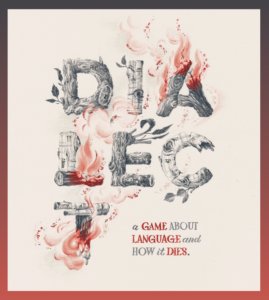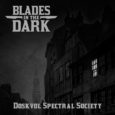 Facilitator: Hakan Seyalioglu
Facilitator: Hakan Seyalioglu
Players: Karen Twelves, Nathan Black, and Sean Nittner
System: Dialect
Backdrop: Worcester School, 1950 (by Graham Walmsley)
After many rounds of Doodle polls trying to sort out when the Computer Age would arrive, it was finally Tea Time!
First game of the year and what fun. Getting together with Nathan, Hakan, and Karen was delightful, if somewhat tricky from the technology perspective. Our setup at home doesn’t work great for having both Karen and me on at the same time, but we persevered and played a great game.
The Backdrop
Graham Walmsley is writing a backdrop called Worcester School, 1950. Somehow we missed the name of the setting and so ended up calling our school Hastings, but I think we got the rest correct. Our remote school, a few hours walk from the nearest town, was not only a place for children to become productive members of society, it was also the place where the first computer in England was being built (at least in our alternative History it was).
Fresh out of World War II and still shaken by it’s affect on the world, every student in Hastings looked to the creation of the first computer as the sign of a new ere, of a Computer Age!
The Characters
Harold St. James (Nathan), a highly regimented young man with a silver spoon neatly tucked and polished in his breast pocket. Harold was a strict enforcer of keeping a tidy life and following the rules to the letter, or at least the rules that he approved of. (Leader)
Lind Grassley (Hakan), a young woman from a rustic family. Her understanding of technology was more intuitive than studied, though she had great aptitude for computing, as well as a love of animals. (Protector)
Catherine Barlde (Sean), a young Jewish refugee who had been adopted by the computing class professor Ms. Bardle. She had spent the last few years since the war, in the presence researchers and scientists and had a fine analytical mind herself. (Oracle)
Florence Rogers (Karen) attended Hastings though she always knew there would be more to life than just civil service. She was fond of taking long walks in the brushes and by the bog, because from there it was easy to slip out of sight and make the long walk to town where she could procure supplied that were in great demand at the school (Scrounger)
Aspects
Regimented – Not only were classes on strict schedules but as students we were also privy to national secrets (or so they told us, in truth students were rarely trusted with more than bread crumbs).
Drive to Succeed – Each of the students were only allowed into the school because they showed a strong aptitude for computing. They were expected to seek a life in public service after they graduated.
Mr. Bardle’s Computing Class – Though we took many other classes the most important of them by far was the computing class, in which we would write proto-bits of code on punch cards, that would eventually be the core programming.
Our Language
A few of the words that we defined and came to define us…
Dr. Hughes – A jovial greeting that started when Florence sneaked up behind Harold in a pub and said “Hello Dr. Hughes” to scare him. That greeting became a common jibe between students, much to the confusion of the actual Dr. Hughes.
Final Stack – The last punch card entered before the computing engine was engaged. When Lind made a last minute correction on the punch card and handed it to Catherine on their first class presentation, they each said “Final Stack” to each other, wishing one another good luck before pulling the lever.
Computing Age – Our dreams of both the the next era, when England would have it’s first computer, and the world would change. It was also, for the students, the age of majority. The age when we would be adults and enter civil service. Catherine thought it would mean peace for humankind, Harold thought the Computer Age would herald the next weapon of war.
Tea Time – Third eighth when we had tea, it meant a time to look forward to.
False Stack – In their final exams, Harold stole the punch cards from Lind and Catherine and replaced them with gibberish card that did not compile. A False Stack. A betrayal!
What Rocked
Since my last playtest I see there have been a number of refinements to streamline the game and simplify or reduce options, which I think is REALLY good. Given limited choices people will do amazing things.
The conversations were great, probably the strongest part of the game (besides the actual playing out of scenes) because they were sheer world building, and by extension language building. They were all about how we as players envision our characters relating to the world. I loved them.
When we were talking about how to define the the word for traitor Nathan stepped up to be the False Stack! I was leaning towards this myself but didn’t want to shoehorn him into it. When he volunteered it made my day.
What could be improved
What I’d still like to see is strong direction on each of the steps (Make of Connection, Build a World, Have a Conversation). We talked about this somewhat during play with the idea of reference cards that told everyone the steps to take, but I’d also like to see the rules take firm hand in that.
We intended to play through our high school career and did so but it was heavily weighted toward the beginning (age one) and the end of school (age two and three). My suggestion for this particular playset is that the school year be divided a bit more evenly. Age 1 was start of school, and Age 2 and 3 were both end (or near end). I’d suggest moving Age 2 to be closer to the middle and making Age 3 about the final exams and the fallout from them.
I’m a stickler for rules. There were several times when folks where jumping form meaning to forming a scene without first connecting the meaning to an aspect or creating a word. I think it’s fine to be flexible with your conversation but it’s important not to forget about important steps before finishing.

